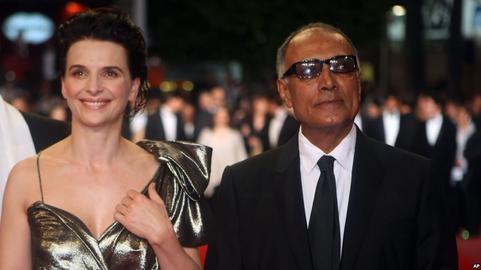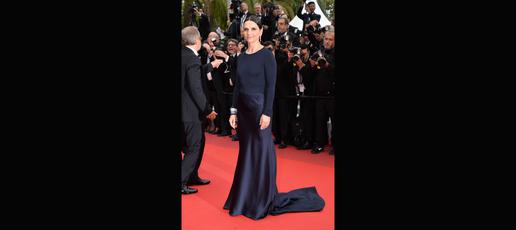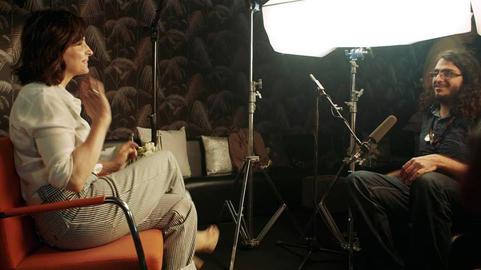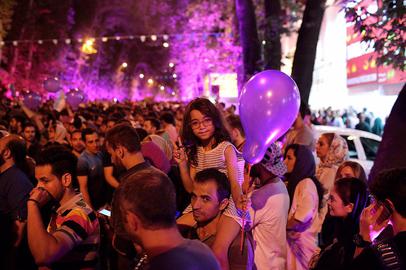A specter is haunting the Cannes film festival: The specter of Abbas Kiarostami. It’s not just Iranians who are especially emotional about the first Cannes without the great poetic auteur, who passed away in July 2016 and whose last film, 24 Frames, will screen in the festival this week.
One of Abbas’s closest collaborators over the last decade of his life was the French actress Juliette Binoche, who is in Cannes with Clare Denis’s Let The Sunshine In, which opened the prestigious Directors Fortnight side section of the festival.
I sat with Binoche for a short interview to hear her thoughts on Abbas and the state of Iranian cinema. We sat on the top floor of Cannes’s Hotel Marriott, and on hearing Kiarostami’s name, the French actress was visibly affected.
“Missing him,” she said, when I asked about her feelings on a Cannes without Kiarostami. She then paused for a few seconds and added: “But it’s interesting. When you love someone, even though he is not there, he is still there. Because feelings allow you to have this person still in you, still in your heart and your thoughts. He left too quickly, of course, and we all feel that. Because he really changed movies. I miss him. He is there for me.”
It took a couple of minutes for Binoche to tell me this; she paused often as she thought about him. With a simple question, her memories of Kiarostami seem to have come alive .
She told me how she admired Kiarostami. “I went to him and told him, I’d love to work with you. But for him this meant: Let’s know each other better first and maybe we can do something together. I think he needed to have some sort of proof that I could come toward him. That’s why I went to Iran. It was proof for him that we could do something together.”
Binoche’s touching emotional response comes across as entirely genuine. I reminded her of a few years ago when she wept upon hearing the news of Jafar Panahi’s hunger strike, as she sat next to Kiarostami at the press conference for Kiarostami’s Certified Copy (2010), which she starred in.
She was categorical when I ask if Iranian cinema has been able to stand on its own feet beyond the work of Kiarostami and his impact.
“Absolutely,” she said. “Abbas really opened a door. Being recognized internationally opened the door for other directors in Iran.”
Our conversation took place on the same day as Iran’s presidential election. A few hundred meters away was the legendary Hotel Carlton, which hosted a most unexpected voting booth for the election. Asghar Farhadi was among the festival goers who came to cast their vote.
“Iran is obviously opening up now,” Binoche says. “People can come to Iran and Iranian directors are coming abroad, even though it’s still difficult.”
She is excited about the repercussions of art. “That’s what movies can do and art is doing. Linking people and allowing to see beyond borders, beyond political and religious issues.”
One value close to her heart is, as she puts it, “women’s freedom and need for that freedom.” And she believes movies can help alleviate the situation both in Iran and elsewhere.
“We still have a lot to do for women, even in the Western world,” she said. “We don’t have the veil here but it feels like we have standards [to meet]; we have to put high heels on the red carpet, for example, even though it’s painful” — a reference to one of the controversial realities of Cannes, the strict dress code people have to follow when walking on the famous red carpet.
“I am part of it as well,” she added. “I put high heels that hurt me and all... it would be very courageous if I went barefoot or wore very flat shoes. It’d be strange — but I don’t have that courage.”
We also talked about her career path and how it came about. In Let The Sunshine In, she is at the height of her career, giving life to an arthouse film in a way very few actors can. But is this where she wants to be? Part of the opening film of Directors’ Fortnight and not, for instance, in a film that could win her an Oscar?
I reminded her that many years ago, she turned down a role in Steven Spielberg’s Jurassic Park to play in Krzysztof Kieslowski’s Three Colours: Blue. That decision, taken at the height of her fame, says a lot about her. Is she happy about it?
“The way I chose my journey?” she asked. “You have to accept the choices were right at the time you took them. I don’t look at my past that much, I am mostly interested in the present. I am taken with the present. I’ve probably made mistakes but that’s all right. It’s part of the journey of learning. I made choices that were weird maybe, but it’s great when films transform people who watch them. That’s what I believe in. That’s success.”
And I think: That’s a powerful definition of success, and seems even more meaningful when uttered amidst the glamor of Hollywood on the French Riviera. It’s easy to see why she connected so well with Kiarostami.
Arash Azizi in Cannes
visit the accountability section
In this section of Iran Wire, you can contact the officials and launch your campaign for various problems



























comments